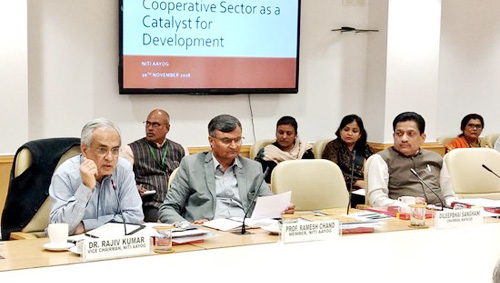It was a cooperative conference with a difference. The Vice-Chairman of Niti Aayog Mr Rajeev Kumar meant business and had no patience for humdrum stories usually dished out in co-operative conclaves. The cooperators numbering more than fifty from across the country were in for a shock when Kumar asked them to avoid tale of success stories and instead focus on issues that hamper co-op movement.
True to its philosophy of ideas travelling from grassroots to top (not from top to down as was the case with planning commission) NITI Aayog’s cooperative conference on the subject “Co-operative Sector as a Catalyst for Development” turned out to be a brain-storming session in which issues throttling the movement were discussed threadbare.
There were a few presentations made by cooperators but Mr Kumar was impatient with long and vacuous stories glorifying the co-operative organization of the presenter. The thrust of the conference became obvious once the CAMPCO representative began to present its success story. “What is the message”, asked Kumar midway. Obviously, he is in hurry like the Prime Minister Narendra Modi to change the situation, quipped a Sahakar Bharati official to this correspondent.
If KG Karmakar, former NABARD MD was asked to be specific, NCDF MD Kishore Suprekar was exhorted to come up with a plan to connect 14 crore farmers with milk production (there are just 1.66 crore farmers into milk production as of now).
Beginning the discussion Uday Joshi, national general secretary of Sahakar Bharati and the point person thanked NITI Aayog Vice-Chairman for responding to Sahakar Bharati request for a broad-based discussion on the subject cooperative. ”We have had several communications with the govt in the past but all that led us to nowhere”, he said.
Satish Marathe who spoke after Joshi felt that co-op should venture into new areas such as communication, rural telephony and service sectors. “We seem to have missed the bus compared to western countries”, he rued. For the teeming millions we need presence of co-op model of business in all sectors, he stressed. Marathe also mooted the idea of self-regulation in cooperatives. He also advocated separate Audit and Accounting norms for the cooperative sector.
Prof Ramesh Chand, NITI Aayog member and point person from Aayog side said unlike Europe the small farmers
Dileep Sanghani thanked NITI Aayog and Sahakar Baharti for holding such a comprehensive conference for the first time in the country. He also reminded the Chair that from Nehru to Atalji, there was never issue of income tax on co-ops. There is a need to look into it, he asked. Jyotindra Mehta wanted the restrictive provisions on co-ops to go and demanded implementation of Bramha Prakash Report. He lamented that due to 80 P there is no capital left for co-ops to grow.
While B K Mishra FISHCOFED MD made a strong case of govt support for going all-out in fish production for doubling farmers’ income, Nandani Azad narrated how women are never a part of decision-making in the cooperatives of the land. “I have won international co-op elections but lost on home ground”, she poignantly sketched the bias in co-ops against women in the country.
Speaking for IFFCO, its DGM Tarun Bharagava said how IFFCO was ahead compared to others in matter of women and youth participation and adoption of latest technology. “We reserved 5% for women among the delegates by amending our bylaws recently”, he said.
Mirai Chatterjee, SEWA Chairperson felt that women should be encouraged for skill-building in new fields as they make good solar technician or water engineer. She also advocated preferential treatment for women co-ops with turnover of less than Rs 5 crore. “We cannot sustain the tendering humdrum,” she added.
The concluding part of the conference saw speakers expressing their views freely with an attentive Vice-Chairman noting down everything that was useful. Kumar seemed to be a man in hurry to introduce course correction in the cooperative movement of the country. His zeal to make a difference in the co-op movement was loud and clear.
By the end of discussion Kumar’s sharp mind noted that majority of issues plaguing co-op today have to do with the implementation of 97th Amendment. He assured the participants that he will try his best to nudge the Agriculture Ministry to fight the case in the Supreme Court earnestly. “We have noted your points and we assure you of our support”, Kumar concluded the discussion.
There was no representation either from the NCUI or ICA.
